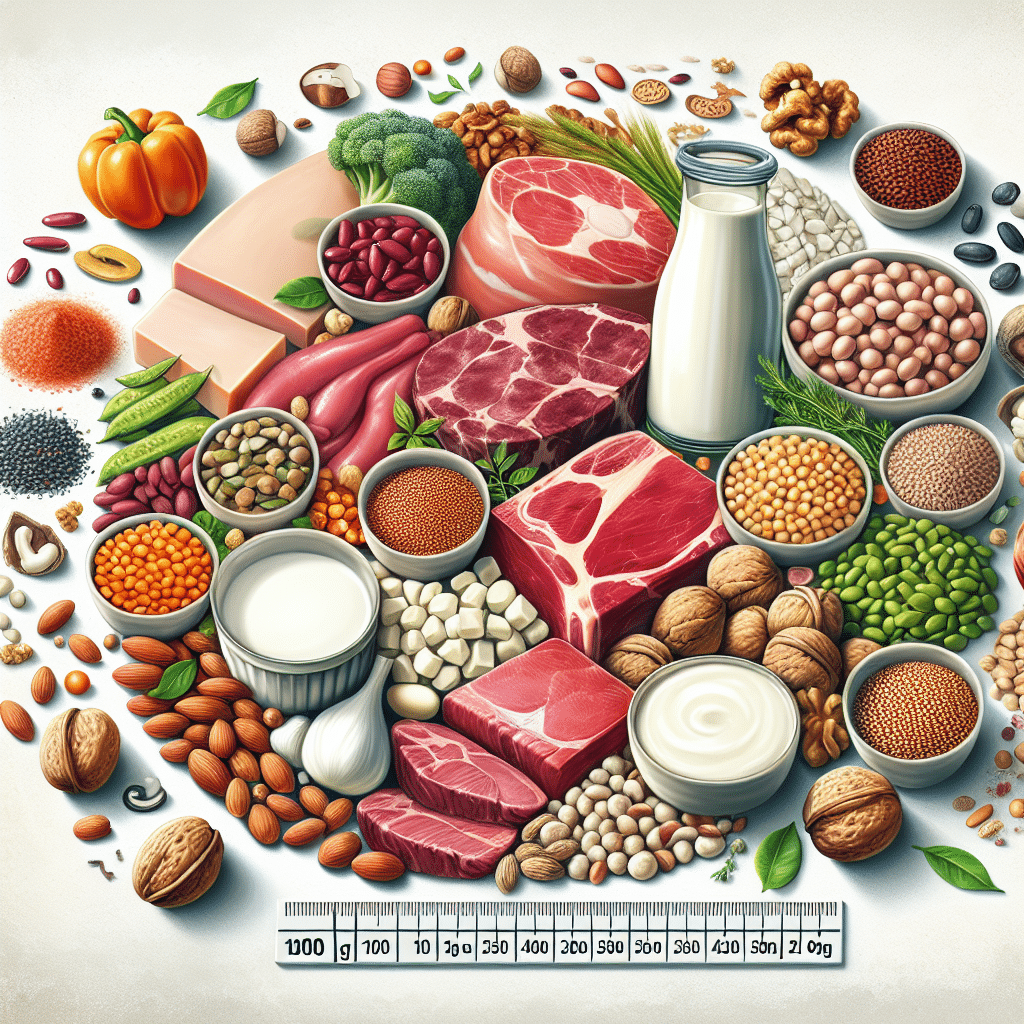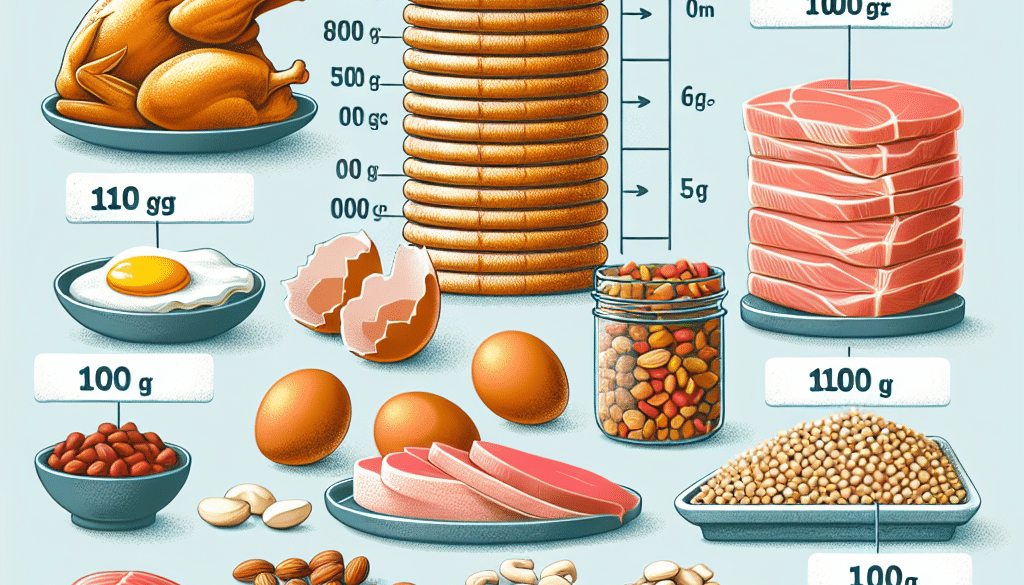Is 100G Of Protein A Lot?
-
Table of Contents
- Understanding Protein Intake: Is 100g of Protein a Day Excessive?
- Understanding Daily Protein Requirements
- Is 100g of Protein a Day a Lot?
- Potential Effects of High Protein Intake
- Choosing the Right Protein Sources
- Case Studies and Statistics
- Conclusion: Balancing Protein Intake for Optimal Health
- ETprotein: Your Source for High-Quality Protein Products
Understanding Protein Intake: Is 100g of Protein a Day Excessive?

Protein is a crucial macronutrient that plays a vital role in building and repairing tissues, making enzymes and hormones, and supporting overall health. However, the amount of protein one should consume daily often sparks debate among health professionals, athletes, and those seeking to improve their diet. A common question that arises is whether consuming 100 grams of protein per day is considered a lot. This article delves into the science of protein requirements, the effects of high protein intake, and how to determine the right amount for your individual needs.
Understanding Daily Protein Requirements
The Recommended Dietary Allowance (RDA) for protein is 0.8 grams per kilogram of body weight for the average adult. This amount is intended to meet the nutritional needs of 97-98% of healthy individuals. However, factors such as age, sex, physical activity level, and overall health can influence protein needs.
- Active Individuals and Athletes: Those who engage in regular physical activity or are athletes may require more protein to support muscle repair and growth. Recommendations can range from 1.2 to 2.0 grams per kilogram of body weight.
- Older Adults: Aging individuals might need higher protein intake to combat muscle loss and maintain strength, with some studies suggesting up to 1.2 grams per kilogram of body weight.
- Weight Management: Higher protein diets can promote satiety and support weight loss efforts, although the optimal amount can vary based on individual metabolism and diet composition.
Is 100g of Protein a Day a Lot?
For a person weighing 68 kilograms (150 pounds), 100 grams of protein would be approximately 1.47 grams per kilogram of body weight, which is above the RDA but within the range recommended for active individuals. However, for someone weighing less or leading a sedentary lifestyle, 100 grams might be excessive and could potentially lead to unwanted side effects.
Potential Effects of High Protein Intake
While protein is essential, consuming it in very high amounts can have implications:
- Kidney Function: There is a common concern that high protein intake could strain the kidneys, particularly in individuals with pre-existing kidney conditions.
- Bone Health: Some research suggests that excessive protein might lead to calcium loss through urine, though this is still debated.
- Digestive Issues: High protein consumption can sometimes lead to gastrointestinal discomfort, constipation, or diarrhea in some individuals.
- Heart Health: Depending on the protein sources, high intake of red and processed meats has been associated with an increased risk of heart disease.
Choosing the Right Protein Sources
When aiming for a higher protein intake, it’s crucial to consider the quality and variety of protein sources:
- Animal-Based Proteins: These include meat, poultry, fish, eggs, and dairy products. They are complete proteins containing all essential amino acids but can also be high in saturated fats.
- Plant-Based Proteins: Sources like legumes, nuts, seeds, and whole grains are excellent options for those looking to increase protein intake while also getting fiber and other nutrients.
Case Studies and Statistics
Research has shown that athletes who consume high-protein diets (up to 2.0 grams per kilogram of body weight) can experience improved muscle synthesis and recovery. Additionally, studies on weight loss have indicated that higher protein diets can lead to greater satiety and reduced overall calorie intake.
Conclusion: Balancing Protein Intake for Optimal Health
In conclusion, whether 100 grams of protein per day is a lot depends on individual factors such as body weight, activity level, and health goals. It’s essential to balance protein intake with other nutrients and choose high-quality sources. Consulting with a healthcare provider or a registered dietitian can help tailor dietary protein to meet personal needs and support overall well-being.
ETprotein: Your Source for High-Quality Protein Products
If you’re looking to incorporate high-quality protein into your diet, ETprotein offers a range of organic bulk vegan proteins that cater to various dietary preferences and needs. Their products are non-GMO, allergen-free, and come with a neutral taste, making them an excellent addition to any meal plan.
Whether you’re an athlete, engaged in weight management, or simply seeking to improve your health, ETprotein’s diverse product line, including rice protein, pea protein, and seed-based proteins, provides you with the necessary building blocks for a balanced diet. Their commitment to purity and quality ensures that you receive the best protein supplements to support your lifestyle.
About ETprotein:
ETprotein, a reputable protein and L-(+)-Ergothioneine (EGT) Chinese factory manufacturer and supplier, is renowned for producing, stocking, exporting, and delivering the highest quality organic bulk vegan proteins and L-(+)-Ergothioneine. They include Organic rice protein, clear rice protein, pea protein, clear pea protein, watermelon seed protein, pumpkin seed protein, sunflower seed protein, mung bean protein, peanut protein, and L-(+)-Ergothioneine EGT Pharmaceutical grade, L-(+)-Ergothioneine EGT food grade, L-(+)-Ergothioneine EGT cosmetic grade, L-(+)-Ergothioneine EGT reference grade and L-(+)-Ergothioneine EGT standard. Their offerings, characterized by a neutral taste, non-GMO, allergen-free attributes, with L-(+)-Ergothioneine purity over 98%, 99%, cater to a diverse range of industries. They serve nutraceutical, pharmaceutical, cosmeceutical, veterinary, as well as food and beverage finished product distributors, traders, and manufacturers across Europe, USA, Canada, Australia, Thailand, Japan, Korea, Brazil, and Chile, among others.
ETprotein specialization includes exporting and delivering tailor-made protein powder and finished nutritional supplements. Their extensive product range covers sectors like Food and Beverage, Sports Nutrition, Weight Management, Dietary Supplements, Health and Wellness Products, and Infant Formula, ensuring comprehensive solutions to meet all your protein needs.
As a trusted company by leading global food and beverage brands and Fortune 500 companies, ETprotein reinforces China’s reputation in the global arena. For more information or to sample their products, please contact them and email sales(at)ETprotein.com today.














